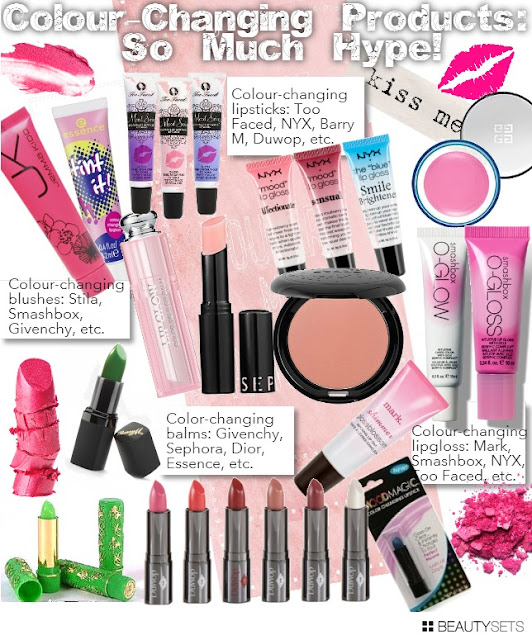I've had a few of these - you can see one that I reviewed here. Back then, I had written that I was suspicious of all those lipglosses claiming to know my body chemistry and pH, and I had written, "in my experience these turn into some generic shade of super-bright pink." So, since all the hype has been going on, I thought I'd do a little bit of the ingredients-analysing that you guys all know and love, and explain just how it is that these glosses/lipsticks/lipbalms/blushes do their work!

With these products, you'll always have a PH-relevant/skin-chemistry-relevant/hocus-pocus-magic-quality relevant shade!
Of course, as the nice little graphic summary I did above shows, we know that these types of lipglosses, lipsticks, and lipbalms have been around for quite awhile. In fact, there are so many of them - in addition to the Dior, Smashbox, and Sephora versions, Mark by Avon, Duwop, Jemma Kidd, and NYX Cosmetics have all jumped on the bandwagon at some point in time. And it's not just US brands that are donig it - Essence Cosmetics and Barry M from Europe have done it too. And even outside the West, other brands have done it - there's Lipice in Asia, and even a strange Morrocan Hare brand from (where else) Morroco! And it's not just lipgloss or lipstick! Cheek products have also been given the special treatment, with Stila, Smashbox and Givenchy all have blush versions to give you that pH-adjusted cheek colour.
So yes, we know everyone loves a colour-changing lipstick/balm/gloss/blush. And who can blame us for loving it? The novelty of seeing the colour change on your lips and cheeks is quite something, I'll admit. The thing is, are they really all that different from one another? How on earth are they even changing colour in the first place? You know that if this post involves some ingredients analysis, there's no better place to start than the ingredients list!
So, for this post, I'm going to look at as many ingredient lists of such colour changing products that I can dig up, including lipbalms, glosses, and lipsticks, and blushes, and see what we can learn from there! In true geek style, there are 10 of them (yes, TEN!), so buckle up!
Continue Reading . . .





0 Yorumlar